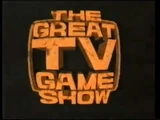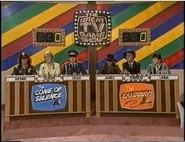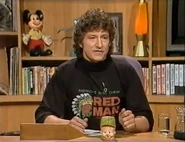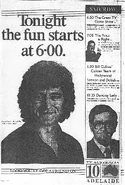| Host | |
| Richard Stubbs & Jane Holmes | |
| Broadcast | |
| Network Ten: 1989 | |
| Packager | |
| Media Arts | |
The Great TV Game Show was a short-lived game show hosted by Richard Stubbs and Jane Holmes. The show aired on the Ten Network in 1989, and was produced by Ian McFadyen from "The Comedy Company" (who would later host an Australian version of Cluedo).
The Great TV Game Show was one of several game shows that would not last the year on Network Ten along with Family Double Dare, The New Price Is Right and Superquiz due to the departure of Bob Shanks. The show focused on the subject of television; as such, the contestants often dressed up as a popular television character. Interspersed in the show were small comedy sketches and special guests.
Gameplay[]
Two teams of three players each competed in a quiz game about television and other forms of popular culture.
The First Five Rounds[]
All six players each had their own buzzer. There were two kinds of questions: regular questions (which were asked by the host), and bonus questions (which were usually asked by special guests, but sometimes the host). For some questions, the first contestant to buzz in with the correct answer scored five points for their team; however, only one player could attempt to answer. Other questions had a series of clues; if a player was wrong on these questions, the other team had one chance for a player to buzz in and steal. A correct answer on a regular question was worth five points, and ten points on a bonus question. In any case, an answer had to be given within three seconds, and there was no penalty for a wrong answer.
Question Types[]
Many questions were regular open-ended questions, but some special question types included:
- Visual – The teams were shown a video or picture and were asked questions about it.
- Act Out a Scene – The show's cast members would act out a scene from one show, while dressed up as characters from another show. The teams had to guess the show being acted out.
- Options – This round had the show's cast members come on stage wearing various costumes, with each of them relating to a specific pop culture category. Sometimes special guests would appear in their actual attire. The team in control would choose a category, and that person would ask a question about that category; usually, the costumed cast members would speak like the characters they were dressed as.
The first player to buzz in with the correct answer would have their team captain choose another question. However, if they gave an incorrect answer, the captain of the other team got to choose. This went on for six questions.
Two Options games were used on each show.
- Mystery Guest – This bonus question had a guest give clues about themselves. The catch was that the voice reading the question sounded nothing like the answer. Thus, the teams had to guess the person by the clues alone. Afterwards Stubbs (and sometimes Holmes) interviewed the guest. Sometimes, after the interview, questions would be asked about the shows that the guest worked on.
- Music – The teams were shown music videos and asked questions about them. There was also a person famous in the music industry asking a bonus question; usually, if the person was dead, one of the show's cast members came on stage dressed as them.
Special Games[]
- Themes – These questions involve the theme songs to various television shows. There were two formats.
- Theme Time – The show's cast would sing the first part of the theme song, and the team would have to sing the rest of it. Afterwards, Holmes would give them a score based on their performance on a scale of 1 (for the worst) to 10 (for the best) and the team would score that many points.
- Identify These Themes – The team would hear six pieces of theme songs lasting five seconds each, with one theme song for each piece. For each theme, they had to guess what show it was from. Each correct answer was worth two points.
- Matching Game – The teams had to match ten television shows to the actors who starred in them within thirty seconds, earning one point for each correct match.
Final Round: Special Subject[]
This endgame was similar to the British game show Mastermind, for the team captains each chose a special subject before the show, and for this round, they were asked questions in that subject for one minute. Each correct answer was worth five points.
The captain of the leading team went first, followed by the opposing team's captain.
At the end of the game, the team with the highest score won a prize.
Tournament[]
All teams competed in a tournament. The winners of the tournament received a trip to Hollywood.
Pictures[]
YouTube clips[]
Episode 1[]
'The Great TV Game Show' episode 1 PART ONE (Richard Stubbs ch 10 1989)
'The Great TV Game Show' episode 1 PART TWO (guest Andrew Daddo)
'The Great TV Game Show' episode 1 Part THREE (guest Gil Tucker of 'Cop Shop')
'The Great TV Game Show' episode 1 PART FOUR (guest Daryl Braiwaite)
'The Great TV Game Show' episode 1 PART FIVE (Hogan's Heroes Quiz)
Episode 2[]
'The Great TV Game Show' episode 2 PART ONE (STAR WARS spoof sketch)
'The Great TV Game Show' episode 2 PART TWO (Richard Stubbs)
'The Great TV Game Show' episode 2 PART THREE (guest Brian Mannix)
'The Great TTV Game Show' episode 2 PART FOUR (guest Lorraine Bayly of 'The Sullivans')
'The Great TV Game Show' episode 2 PART FIVE (guests Marty Monster & Mark Little)
'The Great TV Game Show' episode 2 PART SIX (I Dream Of Jeannie/Evil Dead quiz)



